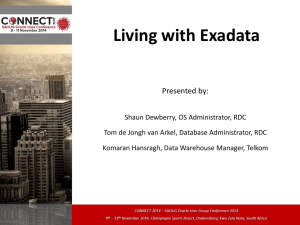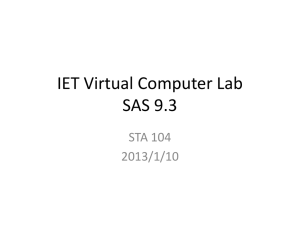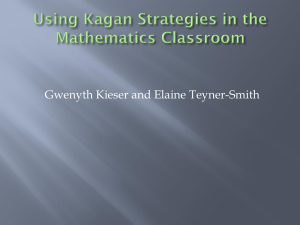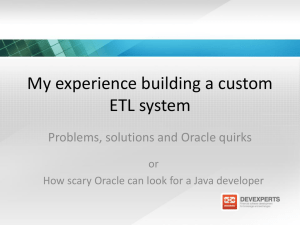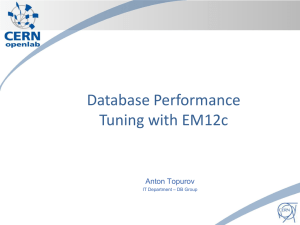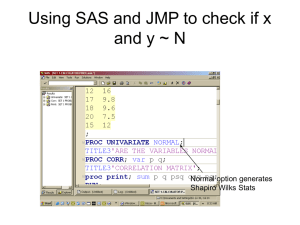OOW 2010 Presentation - Gurcan Orhan`s Oracle Data Integrator Blog
advertisement
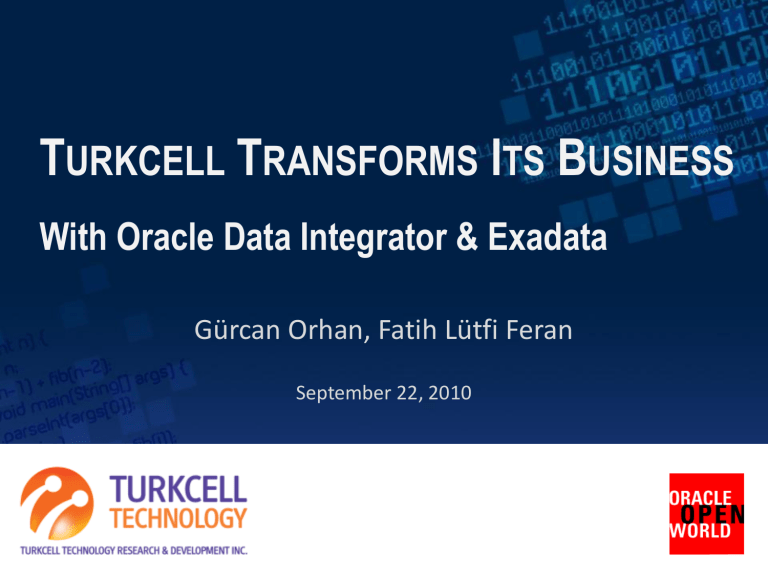
TURKCELL TRANSFORMS ITS BUSINESS With Oracle Data Integrator & Exadata Gürcan Orhan, Fatih Lütfi Feran September 22, 2010 Agenda About Turkcell Technology Introduction to NODI Results Obtained with NODI Best Practices in NODI BIS Datamining Exadata Benefits Agenda About Turkcell Technology Introduction to NODI Results Obtained with NODI Best Practices in NODI BIS Datamining Exadata Benefits About Turkcell Technology Turkcell Technology has more than 15 years of development experience with its solutions applied and proven at leading operators in more than 10 countries. More than 10 years of experience in Turkcell ICT 1994 - 2006 TTECH Center was put into service HC: 255 engineers Focus: Turkcell Group 2007 2008 TTECH company formed with its 44 engineers in TÜBİTAK-MAM Technological Free Zone Focus: Turkcell Focus: Turkcell & Telia Sonera Group + Regional Sales HC: 360 engineers 2009 Focus: Turkcell & Telia Sonera Group HC: 321 engineers Today Areas of Competency From assisting the operation of network resources to improving business oriented intelligence, TTECH’s experts provide an expanding portfolio of packaged and custom solutions for telecom network operators. Network Services & Enablers SIM Asset & Services Management Mobile Marketing Mobile Internet & Multimedia Business Intelligence & Support Systems Turkcell Technology IMS Group More than 10 years of BI experience in Telecommunications industry Designed, Built and Running one of the largest data warehouses in telecom industry Team of more than 100 highly talented professionals and consultants Has a proven record of success in BI operations Flawless operation, providing data for finance and even for NYSE Early adopter of the newest BI technologies Complex Event Processing, Text Mining, etc. Game changer in DWH industry Agenda About Turkcell Technology Introduction to NODI Results Obtained with NODI Best Practices in NODI BIS Datamining Exadata Benefits What is NODI? Network Operations Data Infrastructure A DWH Approach Heterogeneous Environment Designed and Built for only Network Operations Division usage Various Vendors Combining network inventory, performance, alarms, work orders, customer complaints, configuration and traffic in a historical way Reporting Statistical Methods Online and offline value added reporting Real-time data warehousing Finding correlations and relations between different operational systems and making trend analysis Why NODI? Intelligent Combinations Productive Network Planning Decision Support Reporting idle equipments in field Decision Support System in Network Operations eco-system Lights a way from history to future to manage network better and increase performance Trend Based Analysis All-in-one Reporting Determining networking trends in a timely fashion period Reporting different Network related operational systems Integrating different kinds of data, determining correlations and relations NODI Architecture What is Heterogeneous Environment? (Online NODI) EasyForms Merlin Sigos MYSQL Oracle MYSQL Application Integration Application Integration Application Integration MSSQL MSSQL Oracle Toledo Papirus Optima SysLog NG Sigos NOTS OSS file MYSQL MSSQL Sybase ASE daily load for Offline Reporting Offline Reporting Offline Reporting Offline Reporting Oracle Oracle Oracle Oracle Reportmaster Reportmaster Reportmaster Reportmaster NODI Architecture Solution Architecture (Offline NODI) MAXIMO TeMIP Merlin Optima shareplex replication daily extraction daily extraction daily extraction OPERATIONAL DATA STORE (ODS layer) STAGING AREA (Staging layer) data warehouse (DWH Layer) STAGING AREA (Staging layer) data marts (DM Layer) NODI Architecture What is the difference? Agenda About Turkcell Technology Introduction to NODI Results Obtained with NODI Best Practices in NODI BIS Datamining Exadata Benefits What We Have Gained With NODI Reducing Network Operations costs Decreasing alarms and network faults Faster responses to alarms to improve customer satisfaction Decreasing network deduction and forecasting network alarms Supporting Purchase Orders for equipment choices Answer to which equipment works better with which one Periodic material requirements Field and Warehouse based material requirement trend analysis Network Optimization Gathering information about complete Network Infrastructure Agenda About Turkcell Technology Introduction to NODI Results Obtained with NODI Best Practices in NODI BIS Datamining Exadata Benefits Best Practices in NODI Modeling of DWH & DM DM ALARM RELATIONSHIP ANALYSIS DM COMPLAINT ANALYSIS DM ALARM ANALYSIS DM FAULT WORKORDER DM MATERIAL TRANSFER DM QUALITY WORK ORDER DWH DIM DATE & TIME DM NETWORK PERFORMANCE DWH DIM RESPONSIBILITY DWH DIM EQUIPMENT DWH DIM LOCATION DWH FCT WORKORDER DWH FCT COMPLAINT HISTORY DWH FCT MATERIAL TRANSFER DWH FCT NETWORK PERFORMANCE DWH FCT NETWORK ALARMS Best Practices in NODI Modeling of other database objects Reverse Engineering Model Extraction Model Database Objects Model Staging Area Model Best Practices in NODI ODI Knowledge Module - Incremental Update (restructured) Standard Incremental Update Methodology 1. Create target table 2. Drop flow table 3. Create flow table I$ 4. Delete target table 5. Truncate target table 6. Analyze target table 7. Insert flow into I$ table 8. Recycle previous errors 9. Create Index on flow table 10. Analyze integration table 11. Remove deleted rows from flow table 12. Flag rows for update 13. Update existing rows 14. Flag useless rows 15. Update existing rows 16. Insert new rows 17. Commit transaction 18. Analyze target table 19. Drop flow table Restructured Incremental Update Methodology 1. Drop flow table (I$) 2. Create flow table (I$) 3. Insert flow into I$ table 4. Flag rows for update 5. Create Unique Index on flow table (I$) 6. Update existing rows 7. Insert new rows 8. Commit transaction 9. Analyze target table 10. Drop flow table ODI KM optimized for NODI Best Practices in NODI ODI Knowledge Module - Slowly Changing Dimensions (restructured) Standart Slowly Changing Dimension Methodology Restructured Slowly Changing Dimension Methodology 1. 2. 3. 4. 5. 6. 7. 8. 9. 10. 11. 12. 13. 14. 15. 16. 17. 1. 2. 3. 4. 5. 6. 7. 8. 9. 10. 11. 12. 13. Create target table Truncate target table Delete target table Drop flow table (I$) Create flow table (I$) Analyze target table Insert flow into I$ table Recycle previous errors Analyze integration table Create Index on flow table Flag rows for update Update existing rows Historize old rows Insert changing and new dimensions Commit transaction Analyze target table Drop flow table Drop flow table (I$) Create flow table I$ Insert flow into I$ table Create Unique Index on flow table (I$) Analyze integration table (I$) Flag rows for update Flag rows for historization Update existing rows Historize old rows Insert changing and new dimensions Commit transaction Analyze target table Drop flow table (I$) ODI KM optimized for NODI Best Practices in NODI ODI Knowledge Module - Direct Load via DBLink (the new approach) Create target table Faster data load Truncate target table Load data via DBLink Parallel execution in source system Analyze target table Supports many tables from DBlink Best Practices in NODI ODI Knowledge Module – SQL Direct Load (the new approach) Truncate target table Faster data load Drop target table Create target table Load data direct Analyze target table Supports ANSI SQL databases Best Practices in NODI Oracle Implementations to perform faster querying Range Partitioning Hash List Bitmap Indexing B-Tree Agenda About Turkcell Technology Introduction to NODI Results Obtained with NODI Best Practices in NODI BIS Datamining Exadata Benefits Data Mining ETL Reengineering Powered by ORACLE Exadata Oracle Data Integrator Redesign Data Mining ETL Reengineering? SAS vs ODI Need For Reengineering 6 years of development Different analysts & developers Continuously changing business Continuously changing sources How to change ? Change data mining architecture Leave SAS as mining engine Data preparation in Oracle using Oracle Data Integrator Redesign and Rewrite whole data mining ETL Before Pain Points : Query Performance, Extensibility, ETL Performance SAS Dataset preperation, Score Calculation, Model DWH data transformation SAS Extraction SAS Ftp / Remote Table Creation ORACLE Extraction Enterprise Datawarehouse Oracle 9i SAS Extraction SAS Ftp SAS Ftp / Remote Table Creation Data Preparation & Mining SAS End User After Pain Points : Query performance, Extensibility, ETL Performance Enterprise Datawarehouse & Data Marts Oracle 10g ODI Crosstab, Feed, Target SAS Score Calculation, Model ODI SAS Load End User Abinitio Graph&Load Abinitio Extraction Abinitio Load Abinitio Load Abinitio Extraction SAS Ftp / Remote Table Creation Abinitio Load Abinitio Extraction EDWH ETL Abinitio Mining SAS Results Timely delivery, less system resource usage, flexible refresh SAS for ETL coding More than 600 tables ~20.000 Columns 3200 variables After Oracle Data Integrator 361 tables ~10.000 Columns 3906 variables 500 jobs 320 ODI Interfaces 8TB 5,1 TB Monthly refresh Monthly , weekly, Daily refresh ETL runs almost full month 2-3 days beginning of month Before DATA PREPARATION 23-27 DAYS DATA PREPARATION 2-3 DAYS Agenda About Turkcell Technology Introduction to NODI Results Obtained with NODI Best Practices in NODI BIS Datamining Exadata Benefits BI Architecture Pain Points : Query performance, Extensibility, ETL Performance Analysis Cubes 250 TB 50000 Query run/Month Datamart Etl’s AdHoc Reports Average Response Time : 23 Scorecards Dashboards mins Data Mining Why Exadata? Performance • Data intensive processing runs in Exadata storage • Columnar compression Linear Scalability • Massively parallel storage grid Simplified Architecture • Replace a complex system with many storage units • Single Vendor strategy Results Performance • 5 to 400 times ( Average 10 times ) faster query response Simplified Architecture • Single sistem • Single Vendor Size • 100 TB compressed ( ~250TB uncompressed ) database reduced to 25 TB Data Mining ETL on Exadata improvement level # of steps average % perf. impr. avg duration before avg duration Exadata avg duration improvement GOOD 459 4,8 X 3802 796 3005 OK 178 1,4 X 1648 1169 479 NOK 214 2,1 X 1794 3753 -1958 5X 1,5X % 55 Jobs % 20 Jobs % 25 Jobs 2X Data Mining ETL Reengineering Powered by ORACLE 2-3 days ETL run Exadata Oracle Data Integrator 25 to 27 days ETL run Redesign Turkcell Technology Research and Development TÜBİTAK MAM Teknoloji Serbest Bölgesi Gebze – Kocaeli TURKEY ': +90 (262) 677 40 00 7 : +90 (262) 677 40 01 8 : www.turkcelltech.com THANK YOU!

